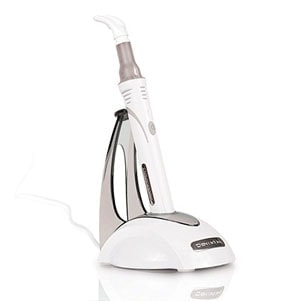Dental anxiety affects about 15 percent of people. People become anxious about oral care and dental procedures for a variety of reasons. Some may have had a bad dental treatment experience in the past. Others anticipate pain and unease from the sounds and vibration from the drill. Many dislike the feeling of being helpless or out of control while being treated, especially while under sedation. Some are embarrassed about the state of their oral health. Others worry about the potential cost of treatment. Some have a big fear of dental needles and the potential pain that comes with dental injections.
No matter what the cause, dental anxiety is a real problem. Dental anxiety can lead many people to postpone or skip their dental appointments.
Are you struggling with dental phobia? Consider finding a dentist who uses the DentalVibe Comfort Injection System.
We only get one set of adult teeth, so taking care of them is key. Plus, the longer you put off going to the dentist, the closer you are to running the risk of developing big problems with your gums, your nerves, or worst of all, your bones. Even though dental visits are at the bottom of most people’s to-do lists, the more regularly you visit the dentist, the less trouble you’ll have to in the long run. There are several ways you can banish dental anxiety so you can take charge of your dental health.
1. Find a dentist you can trust
There are many, many dentist’s offices for you to choose from. Dentists and their teams all have different personalities, varied treatment approaches, and unique office atmospheres. If you aren’t comfortable with a certain practice, keep looking. You’ll find one that is right for you.
Your dentist should not only offer the latest treatment methods for all dental issues, they should also be able to confidently handle patient anxiety and concerns.
2. Communicate with your oral health care team
After you find a dentist that you like and trust, take some time to talk to your dentist or oral health care provider about your anxieties or concerns. Your dental providers cannot help you if they don’t know and understand your concerns.
Be specific. Does the angle of the chair in the office bother you? Would you be more comfortable in a different position during your teeth cleaning or treatment? Do sights, smells or sounds in the dental office bother you? Many dental providers are happy to accommodate patient requests and do whatever they can to make patients comfortable.
3. Conquer the unknown
Are you afraid of unknown processes or procedures or are you concerned about potential pain or discomfort? Worried about expenses? Fearing what the treatment might be for that mystery tooth pain? Not sure how your dentist handles dental injections?
Sometimes, fear of the unknown is the biggest issue behind dental treatment fears. Don’t be afraid to ask questions and gather as much information as possible. Being fully informed about costs, treatment procedures, comfort measures and pain control can go a long way toward easing dental fears and anxieties.
Your oral care provider’s office will be able to talk you through treatments, procedures and options to help you feel more informed and confident during routine cleaning or needed treatments.
4. Tackle known fears head on
Instead of hiding dental treatment fears from your oral health care provider or others, admit them. Owning up to your fears is the first step in conquering them. In the process, you may find that you have some other unknown or unnamed anxieties, as well. As you discover these, your dentist can work with you each step of the way to provide comfort and compassionate care.
5. Use one or more coping tools to help ease anxiety
You may find that using some simple coping mechanisms at the dentist’s office helps ease your mind and manage your dental treatment experience. Bring some earbuds and your favorite music to listen to during your routine cleaning. Bring a stress ball to squeeze and squish during your procedure. Such comfort measures can go a long way toward helping you relax during routine cleanings or more complicated treatments.
6. Practice meditation and other relaxation techniques
Part of controlling dental anxiety is quieting your mind and gaining control of panic-filled thoughts and fears. Deep breathing, meditation, and other relaxation techniques can help you find peace before, during, and after dental cleanings and procedures. Talk to your dentist about how to incorporate this into your treatment visit, or try a meditation app on your phone. There are many free options available.
7. Bring some support
Enlisting support can make a big difference. For most dental visits in adult life, you’ve probably gone alone. The company of someone who makes you feel safe and relaxed may help change the feelings you have about going to the dentist. The more comfortable you feel, the less intimidated and anxious you’ll be about going.
8. Don’t do it all at once
If you have more than one dental procedure that’s needed, you might be tempted to do as much as possible during one appointment to avoid multiple visits. But it’s much more peaceful to take the opposite approach: start with less stressful procedures first, like a cleaning or check-up. Tackling dental care one item at a time and spacing out appointments can prevent you from feeling overwhelmed.
9. Take advantage of new technologies
Dentists are always developing new processes, tools, and treatment options that will deliver a comfortable and anxiety-free dental experience for patients.
Many oral health care providers use a variety of tools and comfort measures to ensure that patients have a pain-free and anxiety-free visit, whether they come in for a routine cleaning or a more complicated treatment procedure. And many dentists use the DentalVibe Comfort Injection System to completely eliminate the pain that can go along with dental shots during fillings, root canals and other dental procedures.
Don’t let dental anxiety keep you from taking care of your oral health. Avoiding trips to the dentist because you are anxious, scared or nervous is not in your best interest! Avoiding routine checkups can lead to bigger, more painful, more complicated problems that require more extensive treatment. Talk to your dentist about managing your concerns, so that you can enjoy ongoing good oral health for years to come. That’s something to smile about!
















